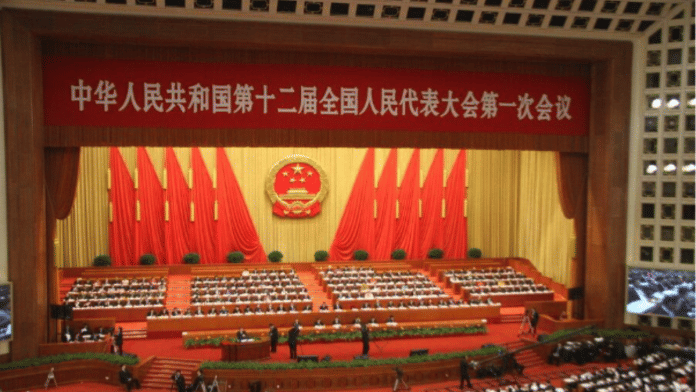China held the third annual session of the 11th National People’s Congress (NPC) from March 5 to March 11, 2025. Zhao Leji, Chairman of the NPC, was notably absent from the weeklong session, which previously use to be a two-week event. While health reasons were cited for Chairman Zhao’s absence, the closing session of the NPC along with its advisory body the Chinese People’s Political Consultative Conference (CPCC) was not attended by all the members of the Politburo standing committee. These shifts from the precedence established in the body since the 1980s along with the fact that this was the second NPC meeting in a row after which premier Li Qiang didn’t give any press conference signals to the tightening control of President Xi Jinping over Chinese politics.
In any case the meeting and the documents released from the same also helps in figuring out the direction in which China might be willing to move on the economic and the foreign policy front. This comes in the dramatic backdrop of Ukraine peace process taking shape as well as a brutal opening to worsening US-China trade relations.
As the US seems more than keen on securing a detente with Russia on the Ukraine conflict and wean Russia away from Chinese dependence, China is also exploring the ways in which it can benefit from rupturing transatlantic ties. While President Trump’s strategy on Ukraine might not give priority to European concerns, Moscow has made sure that the BRICS nations, especially China, are consistently briefed on the negotiations with the US.
Foreign minister Wang Yi, held a press conference on March 7, outlying Chinese approach to global dynamics. Throughout the conference, the minister was highly critical of US’s bullying tactics and named it as the source of global conflicts. The NPC coincided with US imposing high tariffs on Chinese goods which made the atmosphere more bitter. However, the trade war raised another concern among Chinese strategists. More than the direct hit that the exporters in China might take due to the tariffs, they were more concerned about the slump in demand among the US consumers of Chinese products if a recession, as many fear, might take shape in the US market itself.
Along with the US, neighbourhood and the global south were largely discussed during the press conference. Chinese FM briefly talked about India & Japan with a bit harsher language for the latter. While on India, after the de-escalation on the border in October 2024, Wang talked of a cooperative pas de deux of the dragon and the elephant, he perceived Japan as the main enabler of US’s policies in the Asia-Pacific region warning Japan against interference in the region, especially in the Taiwan strait.
Global South got much important mentions during the press conference. Wang highlighted how the worldviews of the Global South countries align more with those of Beijing than with Washington. Examples like neutrality on the Russia Ukraine war, sympathy for the Palestinian issue but most importantly pragmatism over ideology were cited. While the Trump administration is pulling back on Aid, imposing high tariffs on underdeveloped and developing countries, China has implemented a zero-tariff policy for least developed countries in sharp contrast.
With an economy that is in a struggling since the Covid pandemic, a production overcapacity combined in subdued domestic demand and the persistent problems in the property sector, the NPC looked at the high-tech sector with utmost hope. After Deepseek made waves across the world after its launch in January, President Xi held a rare meeting with tech giants last month. Figures like Deepseek founder Liang Wenfeng, Tencent’s Pony Ma, Huawei’s Ren Zhengfei and BYD’s Wang Chuanfu were present in the meeting demonstrating how China might be putting forward these private giants at the forefront of not just its domestic economy but also its development initiatives abroad as it did with the SOEs earlier.
As CCP pursued with its goal of common prosperity in 2022, it came down heavily on private sector technology companies in the Edtech and E-commerce sector. Jack Ma, CEO of the Ant group and founder of Alibaba was one who was believed to be targeted in that purge. His participation during the last month meeting with Xi, indicated a change in course adopted by the CCP.
An AI plus initiative was launched to build what academicians name as a ‘sovereign LLM’ in China. During the NPC, a National Venture Capital Guidance Fund was announced with the objective of mobilizing 1 trillion Yuan to develop sectors such as AI, Quantum Technology, Hydrogen Energy Storage, and others.
These pieces are being published as they have been received – they have not been edited/fact-checked by ThePrint.


